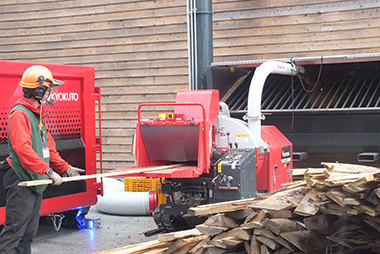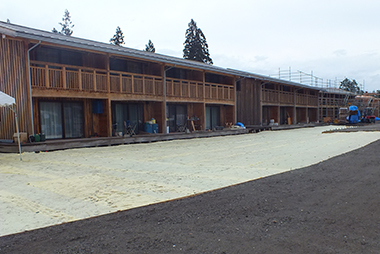Mizuho Leasing Group aims to realize a sustainable society by working with customers to solve social issues, and provide valuable service solutions that help to solve customers' management problems.
Daiwa House Group's Daiwa Energy Co., Ltd. has been developing businesses to introduce energy-saving technologies and renewable energy, etc. to bring about a decarbonized society based on using renewable energy sources, specifically "wind, sunlight, and water."
For Daiwa Energy's large wind-power generation plant "DREAM Wind Ehime Seiyo," we proposed an optimal implementation scheme that makes the most of our accumulated knowledge and know-how in the field of promoting renewable energy. Daiwa Energy adopted this proposal.
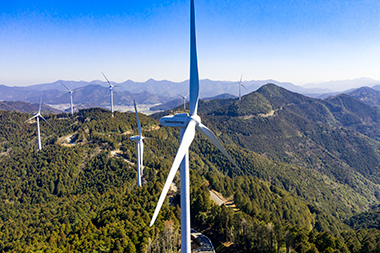
Through PLM Fleet, LLC ("PLM LLC"), a freezer/refrigeration trailer leasing and rental business in the US jointly invested in by Marubeni Corporation and Mizuho Leasing Group, we have started delivering zero-emission* freezer/refrigeration trailers equipped with solar-power generation panels, battery chargers, and freezer/refrigeration units.
The units used for PLM LLC's zero-emission freezer/refrigeration trailers reduce the risk of exposing workers to electric shocks by their low-voltage operation, which improves occupational safety. In addition, the units can operate continuously for a long time by their improved energy efficiency.
The Group will continue to develop environmentally conscious businesses by proactively handling products that apply advanced technologies.
* Zero-emission: An engine, motor, process, etc. that emits no exhaust gases including CO_{2} and NOx while operating.
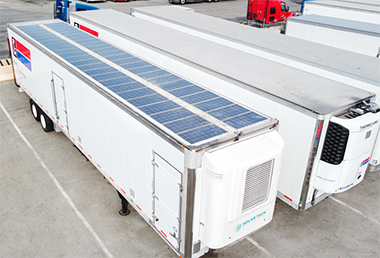
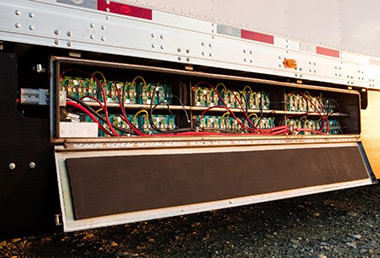
We have executed a project investment-type lease based on the revenues from the sale of electricity from this power generation project through our pay-as-you-go leasing for the hydroelectric power generation equipment to be used at a hydroelectric power plant (Shirakawa Power Station) operated by the JNC Group in Ozu-cho, Kikuchi District, Kumamoto Prefecture.
The Shirakawa Power Station is a hydroelectric power plant with a generating capacity of 9,500 kW (annual power generation for approximately 13,900 average households) that started operation in 1914 and underwent a major renovation in 2020. In addition to having low carbon dioxide emissions, hydropower generation here is characterized by its low environmental impact, as it does not require a large dam and uses an "run-of-river type" system to generate electricity by removing debris from river water, directing it through a channel to a water tank and then letting it fall through a penstock to turn a water turbine.
As the importance of responding to climate change and issues related to resources and energy continues to increase, the Mizuho Leasing Group is committed to working with our customers to realize a sustainable society by contributing to the realization of a decarbonized society through our business activities.
Tohoku Air Service Inc., one of companies of Tohoku Electric Power Group, patrols and inspects power-transmission lines and transports goods by helicopter. The company also operates and maintains disaster-prevention helicopters as well as medical helicopters with a doctor aboard. Tohoku Air Service Inc. draws on its trusted experience and expertise in helicopter operations to save lives.
Tohoku Air Service used our leasing services when it introduced Kawasaki BK117C-2 helicopters for its power-equipment patrol and air ambulance services.
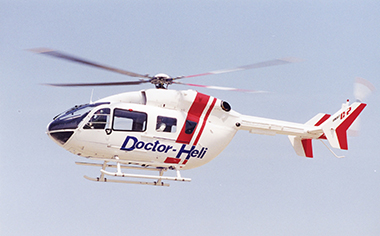
Mizuho Leasing Group is collaborating with Paramount Bed Co., Ltd., a leading manufacturer and distributor of medical and nursing beds in Japan, to provide rental services for maintaining safety. One such service is "Nemuri Scan," a monitoring support system.
Nemuri Scan is a sheet-type sensor that makes it possible to grasp the user's breathing rate, heart rate, sleep state, arousal state, waking, motion to get out of bed, and so on in real time even from a remote location. Medical clinics and other facilities for the elderly can use this system to monitor people while they sleep and grasp their living conditions. Nemuri Scan is utilized to improve users' safety, reduce the burden on caregivers, and to save labor at care facilities.
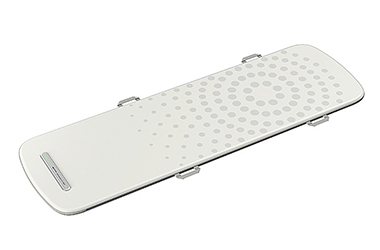
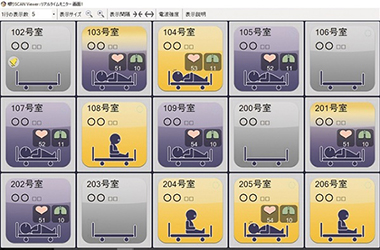
Coastal areas of Tokyo are home to many attractive places and resources for business and tourism as well as places to live, and these areas are expected to grow further in the future. Responding quickly to increases in traffic demand in the coastal areas, the Metropolis of Tokyo has planned a Bus Rapid Transit (BRT) system connecting the downtown areas to the coastal areas as a new means of public transport that supports regional development, and has started operating*1 as "Tokyo BRT."
The BRT buses, which are currently operated by Keisei Bus Co., Ltd., have a 1.5 times the carrying capacity of conventional buses and are hybrid vehicles that emit less environmentally hazardous substances. We proposed a leasing introduction scheme that uses the Ministry of the Environment's subsidy program, and the company adopted our proposal.
*1 The system began preliminary operations of the system on October 1, 2020.
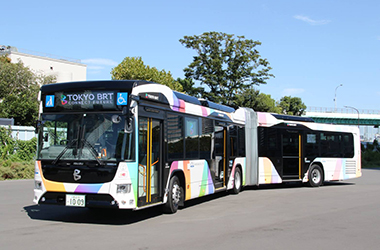
The "VESTA Project" launched in Osaki City, Miyazaki Prefecture, is an initiative for building a new circular society that aims for sustainable forest development, local production of energy for local consumption, and revitalization of lower uplands through cascade utilization of forest resources. This project involves sharing nearby forest resources across the region and using trees for a wide range of applications such as building and furniture materials so that no material goes to waste (making the most of wood by-products and left-over materials).
Wood-based by-products and forest-thinning waste that used to be thrown away are turned into chips, which are used to generate electricity and heat at the same time through a cogeneration system. The generated electric and thermal energy are then used to power "Sustainavillage Naruko," eco-housing recently built with local lumber at the site using the Itakura method.
The project also covers tourism, environmental education, outdoor programs, and so on, with the aim of achieving symbiosis across the entire region with forest resources as the core.
Through leasing wood-chip manufacturing equipment and boiler equipment, Mizuho Leasing Group supports the VESTA Project in realizing a sustainable circular society.
